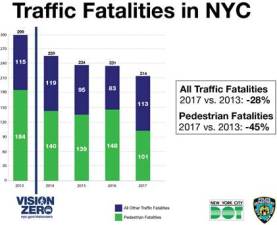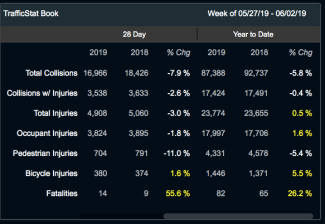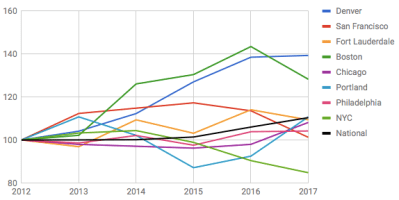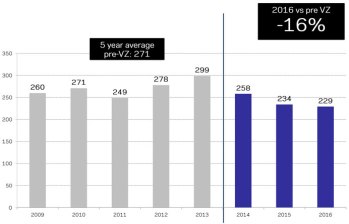Traffic Fatalities are Way Up — Is Vision Zero Becoming Unfocused?
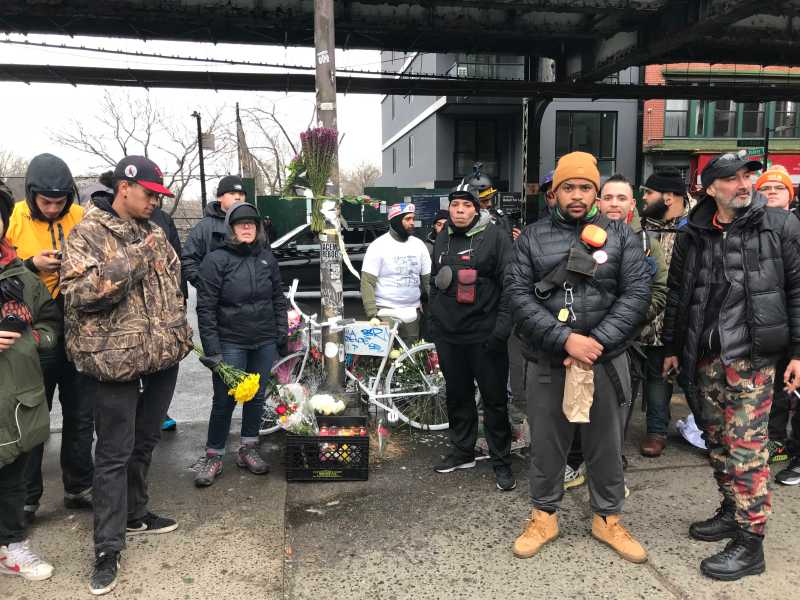
It has been a very bloody year on New York City streets.
The NYPD’s latest stats show that fatalities are up 38.5 percent so far this year, with 54 people dying from Jan. 1 through April 7 — up from 39 over the same period last year.
If that bloodshed were to continue at that pace, fatalities would be on pace to reach roughly 280 deaths, up from the 202 that city officials say were recorded last year and heralded by city officials as a watershed moment for Vision Zero.

It is unclear what is driving the increase in deaths — other than drivers, of course. Total injuries are also up, but only by 1.6 percent this year, even as the number of reported collisions is down 3.4 percent. Injuries to cyclists are up 9.2 percent, with 723 people injured so far this year — an average of more than seven people per day.
Percentages don’t tell the full story: In real numbers, there have been 56,405 collisions reported to the NYPD across the city in just over three months — 10,551 of which caused injuries to a pedestrian, a cyclist or a motorist. Drivers ram their cars into each other, into stationary objects and, of course, into people hundreds of thousands of times every year.
The fatality numbers are more or less gruesome depending on which NYPD command you examine:
- In Brooklyn North, fatalities are up 20 percent — from five last year to six so far this year.
- In Brooklyn South, they have more than doubled, from six last year to 13 this year. Five of those deaths came in the last 28 days. Injuries to cyclists are up 14.4 percent.
- In The Bronx, fatalities are up from six last year to eight so far this year, an increase of 33.3 percent. Injuries to cyclists are also up 23.5 percent.
- In Manhattan North, there have been four people killed so far this year, up from two over the same period last year.
- In Manhattan South, three people have died, up from two. And cycling injuries are up 20 percent.
- In Queens North, a slight uptick in overall collisions has led to an increase in fatalities from seven to 10 so far this year, or a jump of 42.9 percent. Injuries to people who bike are up 32 percent this year.
- In Queens South, fatalities are down to seven this year, from nine over the same period last year, but injuries are way up. Cyclist injuries are up 21 percent, pedestrian injuries are up 3 percent, driver injuries are up 6.7 percent. There have been 7,545 crashes in just that portion of the borough so far this year, or roughly 77 per day.
- In Staten Island, the carnage continues, albeit with lower raw numbers because of the borough’s lower population. Fatalities are up from two last year to three so far this year, and total injuries are up 26.4 percent. Even on quiet Staten Island, there are roughly 28 crashes per day.
The latest reports of a major increase in fatalities came as NYPD officials started a public awareness campaign on Thursday on the dangers of left turns, which drivers typically undertake at higher speeds.
“Left turns are three times as likely as right turns to cause injury to pedestrians and our bicyclists on the roadway,” said NYPD Transportation Chief Thomas Chan. Left-turning drivers killed 21 pedestrians last year — roughly 18 percent of the total 115 that were killed by motorists, according to Chan.
As part of a “public awareness” campaign, the NYPD released a video urging drivers to slow down, use caution and always look both ways when making a left turn. The video featured the families of Allison Liao and Cooper Stock, two children killed by left-turning.
The agency also touted its role in enforcing Vision Zero, saying it wrote 704,284 summonses for moving violations last year, up from 569,754 in 2014, when Vision Zero got underway, an increase of 23.6 percent. It is unclear what percentage of those tickets were written to drivers of cars and what percentage were written against cyclists, who are frequently the subject of NYPD crackdowns, despite causing a minuscule number of injuries — and zero fatalities — compared to drivers.
But that effort comes with some concern that Mayor de Blasio has lost focus for his Vision Zero program. As he ponders a presidential run, de Blasio has been inconsistent on street safety, rejecting calls for more car-free streets and announcing a parking placard crackdown that will actually end up encouraging more NYPD officers and employees to drive to work. A pedestrian safety announcement by the mayor back in February offered little new in the way of proposals. He announced that he would slightly trim the city’s massive vehicle fleet, he left out a key detail: city workers drove 25 percent more miles last year than they did in the mayor’s first year in office. The mayor has also not committed to finishing his own administration’s improvements on Queens Boulevard or restoring the protected bike lanes on Dyckman Street that officials removed last year.
He didn’t even challenge Whoopi Goldberg when she attacked his documented Vision Zero successes!
Meanwhile, City Council President Corey Johnson has been announcing a raft of legislation and proposals that he says are designed to “break the car culture.” This week, the Council’s official response to the mayor’s fiscal year 2020 budget called for far more spending on livable streets issues such as car-free streets, pedestrian plazas and 50 miles of protected bike lanes — roughly three times more than the city built last year.
Activists are worried that Vision Zero is losing its momentum.
“We have always maintained that the pace of implementing life-saving street changes has been wholly inadequate — too many projects are stalled or not initiated at all because of unacceptable deference to the status quo,” said Transportation Alternatives’ co-deputy director Marco Conner. “When Mayor de Blasio holds out on these street redesigns the cost is paid in human lives. Whether based on political calculations or when prioritizing parking over safety, this should be no surprise. Time after time action is not taken until someone is killed — and sometimes even that is not enough. The fourth phase of Queens Boulevard, Ninth Street in Park Slope, and Central Park West are all different examples of live-saving changes either stalled, too late, or not even initiated following tragedy.” (A woman was killed on Amsterdam Avenue last month — another roadway whose life-saving redesign has been stalled by a car-centric community board.)
Conner said that the mayor needs to step up simple, life-saving strategies such as installing more leading-pedestrian-interval signals, sidewalk bulb-outs and plastic bollards.
“We know what works,” Conner said. “He can start by supporting the Vision Zero Street Design Standard bill that now has a super-majority of 43 City Council Members as sponsors and which would save countless lives by providing public transparency and helping to ensure that safety is always prioritized over convenience.”
The city of Cambridge, near Boston, became the first city in the U.S. to pass such a bill, when it voted unanimously last week to require the city to install protected bike lanes whenever it rebuilds a street.
A request for additional information from the NYPD was not returned. The agency has not responded with a comment.

